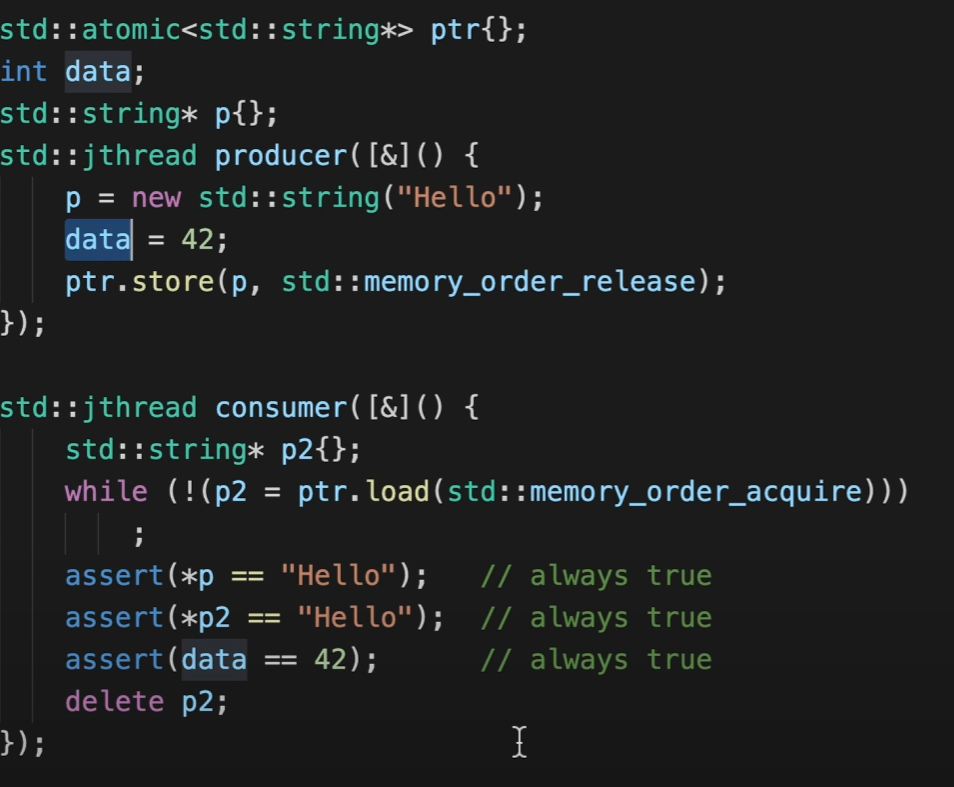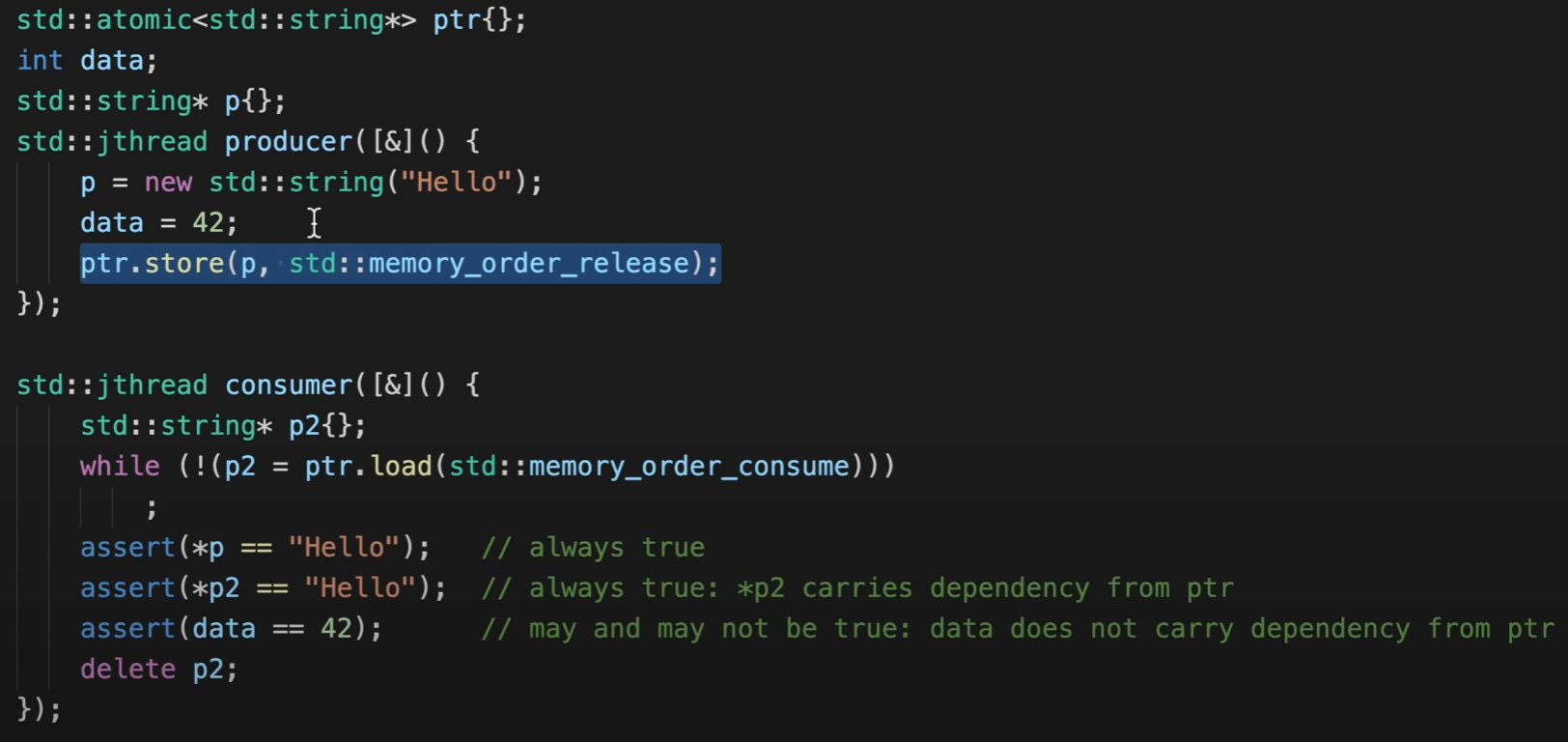|
|
|
|
|
|
C++ Tips
Memory Layout
Code (Text) Segment
Store executable instructions. i.e., functions and member functions.
Data Segment
Global and static variables.
Stack
Temporary variables.
Heap
Dynamic memory allocation. Notice that member variables could be both in stack or heap. It depends on how the object is instantiated.
Miscellaneous
| | | |
| ——– | ——- | ——- |
| const_cast | CPP Reference | |
| std::distance | CPP Reference | CPlusPlus.com |
| std::remove_reference | CPP Reference | CPlusPlus.com |
| std::forward | CPP Reference | CPlusPlus.com |
- Why we need placement new?
- Because memory allocation require calling the kernel. Calling the kernel all the time is bad in terms of performance.
- C++ uses “name mangling to implement overload. That’s why when using a C library, the functions defined in the header needs
extern "C" {}to disable name mangling. -
About intialize list: a class’s member variables will initialize before the constructor is excuted unless you write initializer list in the constructor. Also notice that the order the member variables initialize is not influenced by the order you write the initializer list.
-
In a class definition, do not write initializer for static members, unless
static constexpr. - The static variables defined inside a template function and class may react not as expected:
template<typename T> void foo(const T& x) { static int v=1; cout << v++ << endl; } int main() { foo(1); foo(1.1); // 1 1 } - If global variable is to be used across multiple .c files, you should not declare it static. Instead you should declare it
externin header file included by all .c files that need it.staticis within the compilation unit so every .cpp files that include the header file has its own version of this variable.- In header file, write
extern int GlobalState;and in one cpp file, writeint GlobalState = 1;. - Or alternatively:
// static int a = 1; // don't int GetA() { static int a = 1; return a; }
- In header file, write
- The size of an empty class/struct is 1 byte.
- The two different objects will have different addresses.
- Meyer’s Singleton
class Singleton { public: static Singleton& Instance() { static Singleton instance; return instance; } Singleton(const Singleton&) = delete; Singleton(Singleton&&) = delete; Singleton& operator=(const Singleton&) = delete; Singleton& operator=(Singleton&&) = delete; private: Singleton() = default; ~Singleton() = default; }; - Can I instantiate a abstract class?
- Only if you implemented the pure virutal functions in the abstract class. A function decorated with
=0can have definition. =0asks all the children override this function.
- Only if you implemented the pure virutal functions in the abstract class. A function decorated with
- How to call base method with a pointer/reference to the child object:
child->base::foo() - When using
reinterpret_castfor non-pointer/reference:unsigned int j = 0xffffffffu; int jj = reinterpret_cast<int&>(j);.
distance(first, second)returns the number of increments forfirstto get tosecond. For example,distance(container.begin(), container.end())returns the contianer’s size.
const_castallows you to modify a constant pointer or reference. Noticed that it won’t work for constant variables.int i = 3; const int& rci = i; const_cast<int&>(rci) = 4; const int i = 5; const int* p = &i; *const_cast<int*>(p) = 6; // won't workYou can use
const_castto implementT const& operator[](const size_t&) constwithT& operator[](const size_t&):T const& operator[] (const size_t& idx) const { return const_cast<T&>(*this)[idx]; }- add two numbers using bitwise operationrs:
while(y) { // Carry now contains common set bits of x and y carry = x & y ; // Sum of bits of x and y where at least one of the bits is not set x = x ^ y; // Carry is shifted by one so that adding it to x gives the required sum y = carry << 1; } return x; -
bool hasDifferentSign(int m, int n) { return (m ^ n) < 0; } -
int getLowestBit(int n) { return n & (-n); } -
bool isPowerOfTwo(int n) { return (n & (n - 1)) == 0; } -
bool swap(int& a, int& b) { a = a ^ b; b = a ^ b; a = a ^ b; }
std::remove_reference: make sure the parameter is value, not reference.template<typename T> void foo(typename remove_reference<T>::type param) {}And the implementation of
std::moveneeds it:template<typename T> typename std::remove_reference<T>::type&& move(T&& t) { return static_cast<typename std::remove_reference<T>::type&&>(t); }Sample implementation:
template <class T> struct remove_reference { typedef T type; }; template <class T> struct remove_reference<T&> { typedef T type; }; template <class T> struct remove_reference<T&&> { typedef T type; };
-
std::forward: Perfect forwarding is there to ensure that the argument provided to a function is forwarded to another function (or used within the function) with the same value category (basically r-value vs. l-value) as originally provided.Use it when forwarding parameters to another funcion inside a funtion that has universal reference because rvalue reference is lvalue.
Sample Implementation (think about Reference Collapsing):
template <typename T> T&& forward(typename std::remove_reference<T>::type& param) { return static_cast<T&&>(param); } template <typename T> T&& forward(typename std::remove_reference<T>::type&& param) { return static_cast<T&&>(param); } - Nested template example:
template<template<typename, typename> class Container, typename T, typename TT> void foo(Container<T, TT>& p) { std::cout << typeid(T).name() << " " << typeid(TT).name() << "\n"; } - Force using array as parameter. Pointer not allowed:
template<size_t N> size_t getCStrLength(const char(&str)[N]) { return N; } -
int i = 0xffffffff; unsigned int u = 0xffffffff; cout << i << "\n"; // -1 cout << u << "\n"; // 4294967295 cout << 0xffffffff << "\n"; // 4294967295 - Overloading
+:foo foo::operator+ (const foo& c) const { foo result; // ... return result; } - Overloading
+=:foo& foo::operator+= (const foo& c) { //... return *this; } - Overloading
<<and>>:std::ostream& operator<<(std::ostream& os, const T& obj) { // write obj to stream return os; } std::istream& operator>>(std::istream& is, T& obj) { // read obj from stream if (/* T could not be constructed */) is.setstate(std::ios::failbit); return is; }
Substitution failure is not an error
TODO
Multithreading
std::threadcan run a function on a new thread.#include <thread> void foo() {} int main() { std::thread worker(foo); // do other things... worker.join(); // wait for it to complete }- Call
join()/detach()two times will crash the program. - Call
thread’s destructor beforejoin()ordetach()will crash the program. - When
main()returns, all the detached threads will be suspended by the OS. - Use
std::scoped_lock(C++ 17) orstd::lock_guard(C++ 11) to lock astd::mutexso that you don’t need to release the lock manually. - Use
std::atomic<T>:std::atomic<bool> ready (false); void foo() { while (!ready) std::this_thread::yield(); // use yiled when waiting // do something } - Semophore (busy waiting?)
constexpr int WORKER_NUM = 32; std::counting_semaphore<WORKER_NUM> signal(0); void Scheduler() { signal.release(WORKER_NUM); } void Worker() { signal.acquire(); } - Condition variable (not busy waiting)
std::mutex m; std::condition_variable cv; bool ready = false; void Scheduler() { { std::lock_guard lk(m); } } void Worker() { std::unique_lock lk(m); cv.wait(lk, []{ return ready; }); //... lk.unlock(); } compare_exchange_weakvs.compare_exchange_strong:compare_exchange_weakmay not exchange the desired value and returnfalseeven if the comparing value equals to the memory.compare_exchange_strongwill guarentee the successfulness.- Use compare and swap to implement atomic increment (assume CAS return old value):
T old = *address, assume; do { assume = old; old = CAS(address, old, old+1); } while (old != assume); - Use compare and swap to implement spin lock:
int lock = 0; // ... while (CAS(&lock, 0, 1) == 1) // try to lock it continue; // ... lock = 0; - Use compare and swap to check if atomic operation failed (and keep trying again):
template<typename T> bool CircularQueue::Pop(T& val) { int head; do { head = _head.load(); // if (head == _tail.load()) if (head == _write.load()) // avoid reading the memory that hasn't been written return false; val = _buffer[head]; } while (!_head.compare_exchange_strong(head, (head+1) % _capacity)) return true; } template<typename T> bool CircularQueue::Push(T& val) { int tail; do { // move the tail pointer tail = _tail.load(); if ((tail+1) % _capacity == _head.load()) return false; } while (!_tail.compare_exchange_strong(tail, (tail+1) % _capacity)) _buffer[tail] = val; while (!_write.compare_exchange_strong(tail, (tail+1) % _capacity)) // move the write pointer after writing return true; }
Atomic vs. Mutex
TODO
Memory Barrier
int x = 0, y = 0;
// thread 1
x = 1;
r1 = y;
cout << r1 << "\n";
// thread 2
y = 1;
r2 = x;
cout << r2 << "\n";
The results might all be zero because the optimization of the compiler, or different CPU core having different caches. To synchronize the order of memory RW, we can use mutex. We can also use memory barriers (faster than mutex).
Memory barriers will guarantee that the order of RW memories will be the same as the order of the source codes. E.g., thread 1 may execute r1 = y before x = 1 because the optimization by the compiler. Using memory barriers can force the execution order.
int x = 0, y = 0;
// thread 1
x = 1;
STORELOAD_FENCE();
r1 = y;
cout << r1 << "\n";
// thread 2
y = 1;
STORELOAD_FENCE();
r2 = x;
cout << r2 << "\n";
In this case the results might be 1 1, 0 1, 1 0 but never 0 0!
- Basic types:
-
Load-Load
The loads before the barrier will happen before the loads after the barrier.
-
Store-Store
The stores before the barrier will happen before the stores after the barrier. Think of
git push. -
Load-Store
-
Store-Load
-
- Acquire: Load-Load + Load-Store
-
Every memory R/W after Acquire stays after Acquire.

-
- Release: Load-Store + Store-Store
-
Every memory R/W before Release stays before Release.

-
Memory Order
Sequence Consistent (strictest)
std::atomic<bool> x { false };
// in thread, write
x.store(true, std::memory_order_deq_cst);
// in thread, read
bool y = x.load(std::memory_order_deq_cst);
Sequence Consistent guarantees the memory RW order is the same as source codes (memory barriers).
It also guarantees if at a certain time t, a thread R/W the atomic variable, all the threads after t will see the results after this R/W. E.g., if thread 1 writes the variable with 1 at time t, then all the threads at t+1 loading the variable will get 1. (think of how it might not be 1 on a multi core CPU)
Relaxed (least strict)
std::memory_order_relaxed. Used in shared_ptr
Relaxed guarantees the R/W is atomic. It doesn’t guarantee the order of executions of R/W is the same as the source codes. (no memory barriers)
Acquire & Release
See Memory Barriers.
```std::memory_order_release```
All the memory R/W before Release will be seen by Acquire.

### Consume
```std::memory_order_consume```.
Consume is weaker than Acquire. It won't carry dependancies from memories that not related to Release.

## Memory
- Packing (padding is the size of struct's largest element):
```cpp
struct A { // size 16
int a;
double e;
};
struct B { // size 12
char a; char b; char c;
int d;
char e;
};
struct C { // size 24.
// padding is not sizeof(A) but still sizeof(int). nested structures doesn't change padding
// but sizeof(aa) is still A's size.
int a; // 8
A aa; // 16
};
struct D { // size 24.
// padding is not sizeof(A) but still sizeof(int). nested structures doesn't change padding
// but sizeof(aa) is still A's size.
int a; // 8
A aa; // 16
int b; //8
};
To disable packing, #pragma pack(1). Without packing, CPU deoes more readings.
- Impact of VPtr:
class A { // size 1 char a; } class B { // size 16 char a; virtual void foo() {} }
realloc |
CPP Reference | CPlusPlus.com |
calloc |
CPP Reference | CPlusPlus.com |
std::allocator |
CPP Reference | CPlusPlus.com |
realloctries to expand or compress the exisiting memories. If there is not enough memory, the old memory block is not freed and null pointer is returned.calloctakes two arguments and initializes the allocated memory block to zero:int *arr = (int*)calloc(n, sizeof(int));callocis slower thanmalloccause it will initialize the memory to 0.
- Placement new: Explicitly create objects on a specifized memory block.
char* buffer = new char[sizeof(MyClass)]; MyClass* obj = new (buffer) MyClass();
Object Pooling can be achieved with placement new. allocatoris a wrapper formallocandfree.MyClass* buffer = std::allocator.allocate(5); for (int i = 0; i < 5; ++i) { allocator.construct(&buffer[i], MyClass()); } for (int i = 0; i < 5; ++i) { allocator.destroy(&buffer[i]); } allocator.deallocate(buffer, 5);
STL
- To sum:
reduce(container.begin(), container.end).- Python equivalent:
sum(container).
- Python equivalent:
- Customize the reduction operator:
auto multiply = [](int x, int y) { return x * y; }; int product = reduce(container.begin(), container.end(), 1, multiply); - Find the maximum element:
max_element(container.begin(), container.end) - Binary search:
lower_bound,upper_boundorequal_range. The container must be sorted.lower_boundandupper_boundreturn the iterator.equal_rangereturns a pair of iterators.lower_boundreturns the first element that not less than the query andupper_boundreturns the first element that greater than the query. - To reverse:
reverse(container.begin(), container.end()). partition(firstIt, secondIt, unaryPredicate)can divide the container into two groupds: those for which the predicate returns true and those for which it returns false. It returns the iterator to the first element of the second group. An good example ofpartitionis Quick Sort.make_heap(container.begin(), container.end()). Directly constructs a heap. The first element is the top.push_heap(container.begin(), container.end()). Only effective when the container is already a heap except for its last element. You want to insert a new element into the tail of the container and callpush_heap.pop_heap(container.begin(), container.end()). Only effective when the container is already a heap. The top will be swapped to the last element.[begin, end)is still a heap.
Algorithms
Prim
void prim(vector<vector<ii>> const& adj, int s) {
priority_queue<ii, vector<ii>, greater<ii>> pq;
parents.resize(N);
keys.resize(N, INT_MAX);
keys[s] = 0;
pq.emplace(0, s);
while(!pq.empty()) {
auto [d, u] = pq.top();
pq.pop();
if(d > keys[u])
continue; //lazy deletion
for(auto &[v,w]: adj[u]) {
if(w < keys[v]) { // note: difference here
keys[v] = w;
parents[v] = u;
pq.emplace(keys[v], v);
}
}
}
}
Quick Sort
vector<int> sortArray(vector<int>& nums) {
quickSort(nums, 0, nums.size()-1);
return nums;
}
void quickSort(vector<int>& nums, int left, int right)
{
if (left >= right) return;
if (left < 0) return;
if (right >= nums.size()) return;
int pivot = nums[(left+right) / 2];
swap(nums[left], nums[(left+right) / 2]);
int i = left;
int j = right;
while (true)
{
while (nums[j] >= pivot && j > i) j--;
if (j == i) break;
while (nums[i] <= pivot && j > i) i++;
if (j == i) break;
swap(nums[i], nums[j]);
}
swap(nums[left], nums[i]);
quickSort(nums, left, i-1);
quickSort(nums, i+1, right);
}
Quick Select
